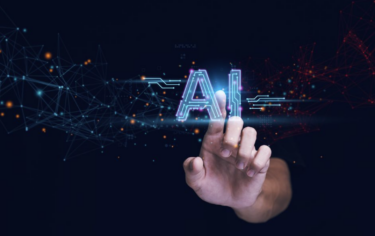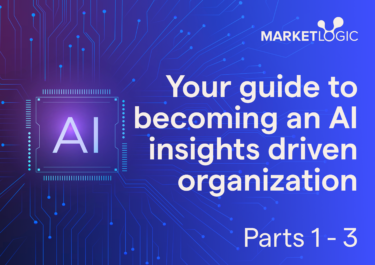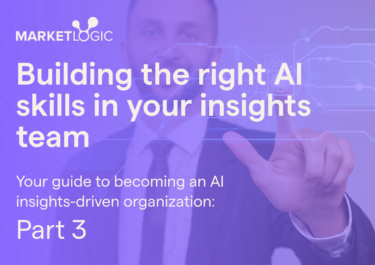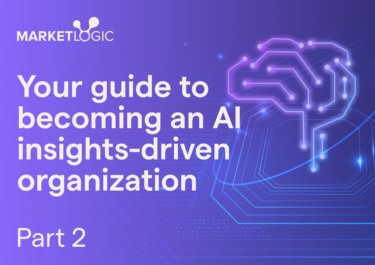
May 2, 2018
Read time: 4min

May 2, 2018
Read time: 4min
In our ‘Disruptors’ webinar series, we look at industries undergoing major changes, inviting experts to explain key trends and what insights and intelligence professionals can do to tackle them.
The webinar ‘Tackle retail disruption with faster speed to insight’ discusses how for the past few years, the Retail industry has been in a state of near-constant disruption. This makes the need for high-speed insight more valuable than ever. Market Logic convened a trio of panelists: retail experts Alison Chaltas, Global President P2P at Ipsos and Steffen Sorrell, Principal Analyst at Juniper Research; and Martin Rückert, Market Logic’s Chief A.I. Officer. The Webinar was moderated by Elizabeth P. Morgan, Co-Founder & SVP of Marketing at Market Logic.
Alison kicked off the webinar by explaining Alibaba’s concept of “New Retail,” which refers to an ever-changing shopper experience that combines physical and digital interactions. She quizzed the audience on the identities of three visionaries that every retail insights professional should know: Jack Ma of Alibaba, Jeff Bezos of Amazon, and Sam Walton of Walmart.
Alison noted e-commerce has exploded over the past decade, with China emerging as the #1 online market in the world, followed by the U.S.A. and U.K. In China alone, the percentage of retail sales that took place online in 2016 was 20%, and this number is estimated to grow to 34% in 2019. Of course, a large part of this explosion is due to Alibaba, whose profits already eclipse Amazon and Walmart combined.
Part of this strategy is to stay fresh: Alibaba is combining physical and digital in groundbreaking ways to bring new retail experiences to customers, along with ideas ranging from car vending machines to the digital transformation of family-owned stores. Amazon, for its part, has just launched their first brick-and-mortar store, Amazon Go, as well as opened mall ‘pop-up’ stores to boost exposure to Alexa.
She also highlighted Walmart’s Store Number 8, a Silicon Valley-based venture they founded to find and explore pioneering startups with new ideas about retail. Here, Alison mentioned radical concepts such as secure in-home delivery directly to the customer’s fridge.
This isn’t to say that e-commerce will outstrip normal retail. According to Alison, “in categories where consumers want to touch and feel their products, such as food, there’s still a huge preference for in-person shopping… What’s needed is to think differently, and to keep in mind that it’s not just business as usual.”
Steffen Sorrell then shared two key trends: the importance of “conversational commerce” using chatbots, and using AI for demand forecasting. Both trends are growing quickly: chatbots are getting smarter and consumer behavior is getting less predictable.
Steffen noted that though still in early stages, the outlook is that “chatbots will become an important way for consumers to purchase goods within the next 3-4 years.” With regard to AI, he said machine learning is augmenting traditional demand forecasting techniques, by “identifying previously unseen patterns to help predict where the demand will be and how to provide a better customer experience.”
“Using AI to improve the retail experience and identify patterns will give companies a strong advantage moving forward. If a retailer can leverage chatbots and AI to understand context and intent in a way that pleases consumers, that will differentiate them moving forward.”
Market Logic’s Chief AI Officer Martin Rückert then explained how retailers can leverage AI technology for faster speed to insight, with insights platforms that bring all their research and data together to stay abreast of change. As he says, “What the human brain has problems with is connecting dots of fast-flying knowledge: so everything that is new and you haven’t absorbed, your brain has problems predicting what the result or logical outcome of that knowledge will be.” Therefore, machines can help us to connect the dots and see the patterns between insights.
Insights can be filtered by consumer category, and the platform can search through videos in multiple languages. A cognitive dossier synthesizes answers to questions on topics like barriers, drivers, and trends. He shared a live software demo to show how AI gathers answers to merchandiser questions from primary research, secondary sources, and spreadsheet data, as well as social media newsfeeds and videos.
You can find out more about our platform and request a demo.
Innovation and ad copy testing libraries can be integrated so that marketers and researchers can learn from past tests. Information on key topics is collected and promoted in knowledge zones, while insights from multiple sources can be curated in Ipsos insight clouds.
Finally, intelligence dashboards are one of the best ways to bring together breaking news from secondary sources, RSS feeds, and google alerts: cognitive intelligence then cuts out white noise, making the experience personalized so that users see what they need to see.
In the Q&A session, the discussion focused on the potential implications of the Amazon Go store launch, which has revealed conflicting shopper experiences. According to Alison, “Some shoppers love the efficiency of shopping in a cashier-free environment, while others dislike the lack of human contact.”
At the end of the day, whether there’s human interaction or not, categories, where consumers prefer to see and touch a product in person, will remain stronger in person than online. As Alison says, “What’s needed is to think differently and to keep in mind that it’s not just business as usual.”
In times of rapid change, keeping the newest information on top is of key importance. Martin explained that A.I.-powered insights platforms don’t try to make recommendations that are 100% correct. Rather, they inform users about what’s relevant to them, with newer information prioritized above older information.
Customer expectation has never been higher, and retail is the total disruption. Alison observed that agencies often receive briefs asking them to answer questions that have already been answered, with new questions piled on top.
Researchers are already sitting on mountains of data. What’s needed is a way to pull together all this data and learn continuously from it to confront tomorrow’s business questions. This is where AI helps us to augment ourselves: solutions that use artificial intelligence to improve our abilities are a clear step in the right direction.
Find out more about our Insights Platform by requesting a demo.

How is AI transforming roles, skills and capabilities in insights functions?

Interview with Nextatlas CEO Luca Morena

An introduction to gen AI for businesses. From RAG to LLMs — get the lowdown.

Exploring the Future of AI in Marketing: Integrating Insights into Business Systems for Enhanced Decision-Making.

To succeed in today's dynamic consumer landscape, your organization must be able to react faster…

How does this guide help you? In part 3 of our guide, we’ll delve into…

Learn the AI insights-powered enterprise systems architecture and processes.

Transform your organization with insights. Download this guide to find out how.